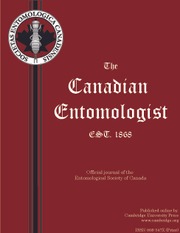Crossref Citations
This article has been cited by the following publications. This list is generated based on data provided by
Crossref.
Proverbs, M. D.
and
Newton, J. R.
1962.
Some Effects of Gamma Radiation on the Reproductive Potential of the Codling Moth, Carpocapsa pomonella (L.) (Lepidoptera: Olethreutidae).
The Canadian Entomologist,
Vol. 94,
Issue. 11,
p.
1162.
Dustan, G. G.
1964.
Mating Behaviour of the Oriental Fruit Moth, Grapholitha molesta (Busck) (Lepidoptera: Olethreutidae).
The Canadian Entomologist,
Vol. 96,
Issue. 8,
p.
1087.
Proverbs, M. D.
Newton, J. R.
and
Logan, D. M.
1966.
Orchard Assessment of the Sterile Male Technique for Control of the Codling Moth, Carpocapsa pomonella (L.) (Lepidoptera: Olethreutidae).
The Canadian Entomologist,
Vol. 98,
Issue. 1,
p.
90.
Gardiner, L. M.
1966.
A Photographic Record of Oviposition by Rhyssa lineolata (Kirby) (Hymenoptera: Ichneumonidae).
The Canadian Entomologist,
Vol. 98,
Issue. 1,
p.
95.
Anwar, M.
and
Féron, M.
1971.
Mating behaviour of gamma irradiated and non irradiated European corn borer, Ostrinia nubilalis (Hübner).
The International Journal of Applied Radiation and Isotopes,
Vol. 22,
Issue. 2,
p.
89.
Outram, I.
1971.
ASPECTS OF MATING IN THE SPRUCE BUDWORM, CHORISTONEURA FUMIFERANA (LEPIDOPTERA: TORTRICIDAE).
The Canadian Entomologist,
Vol. 103,
Issue. 8,
p.
1121.
Cantacuzène, A.M.
Lauverjat, S.
and
Papillon, M.
1972.
Influence de la température d'élevage sur les caractères histologiques de l'appareil génital de Schistocerca gregaria.
Journal of Insect Physiology,
Vol. 18,
Issue. 11,
p.
2077.
Levin, Malcolm P.
1973.
PREFERENTIAL MATING AND THE MAINTENANCE OF THE SEX-LIMITED DIMORPHISM INPAPILIO GLAUCUS: EVIDENCE FROM LABORATORY MATINGS.
Evolution,
Vol. 27,
Issue. 2,
p.
257.
ANWAR, MOHAMMAD
ASHRAF, MOHAMMAD
and
ARIF, M. D.
1973.
MATING, OVIPOSITION AND GAMMA STERILIZATION OF THE SPOTTED BOLLWORM OF COTTON, EARIAS INSULANA.
Entomologia Experimentalis et Applicata,
Vol. 16,
Issue. 4,
p.
478.
Otvos, Imre S.
1974.
A COLLECTING METHOD FOR PUPAE OF LAMBDINA FISCELLARIA FISCELLARIA (LEPIDOPTERA: GEOMETRIDAE).
The Canadian Entomologist,
Vol. 106,
Issue. 3,
p.
329.
GONEN, M.
1977.
SURVIVAL AND REPRODUCTION OF HEAT‐ACCLIMATED SITOPHILUS GRANARIUS (COLEOPTERA, CURCULIONIDAE) AT A MODERATELY HIGH TEMPERATURE.
Entomologia Experimentalis et Applicata,
Vol. 21,
Issue. 3,
p.
249.
Bucher, G. E.
and
Bracken, G. K.
1977.
THE BERTHA ARMYWORM, MAMESTRA CONFIGURATA (LEPIDOPTERA: NOCTUIDAE). STERILIZATION OF ADULTS BY EXPOSURE OF PREPUPAL–PUPAL STAGES TO 25°C.
The Canadian Entomologist,
Vol. 109,
Issue. 4,
p.
549.
WHITE, L. D.
1981.
SURVIVAL AND REPRODUCTION OF CODLING MOTHS EXPOSED TO 33° DURING LARVAL AND PUPAL DEVELOPMENT.
Entomologia Experimentalis et Applicata,
Vol. 29,
Issue. 1,
p.
98.
DRUMMMOND, BOYCE A.
1984.
Sperm Competition and the Evolution of Animal Mating Systems.
p.
291.
Shaffer, Phillip L.
and
Gold, Harvey J.
1985.
A simulation model of population dynamics of the codling moth, Cydia pomonella.
Ecological Modelling,
Vol. 30,
Issue. 3-4,
p.
247.
Bodnaryk, Robert P.
and
Gerber, George H.
1988.
Inhibition of Spermiogenesis of Eupyrene Spermatozoa by Elevated, Sublethal Temperatures During Pupal-Adult Development of the Bertha Armyworm,Mamestra con figurataWlk. (Lepidoptera, Noctuidae).
International Journal of Invertebrate Reproduction and Development,
Vol. 13,
Issue. 1,
p.
65.
Carroll, Allan L.
and
Quiring, Dan T.
1993.
Interactions between size and temperature influence fecundity and longevity of a tortricid moth, Zeiraphera canadensis.
Oecologia,
Vol. 93,
Issue. 2,
p.
233.
Ali, Mahmoud Fadl
Abdel-Reheem, Elham F.M.
and
Abdel-Rahman, H.A.
1997.
Effect of temperature extremes on the survival and biology of the carpet beetle, Attagenus fasciatus (Thunberg) (Coleoptera: Dermestidae).
Journal of Stored Products Research,
Vol. 33,
Issue. 2,
p.
147.
Markwick, N. P.
Whiting, D. C.
and
Lilley, C. M.
1998.
Quarantine implications of exposing Epiphyas postvittana (Walker) (Lep., Tortricidae) larvae to sub‐lethal high‐temperature controlled atmosphere treatments.
Journal of Applied Entomology,
Vol. 122,
Issue. 1-5,
p.
613.
Neven, Lisa G
2000.
Physiological responses of insects to heat.
Postharvest Biology and Technology,
Vol. 21,
Issue. 1,
p.
103.

